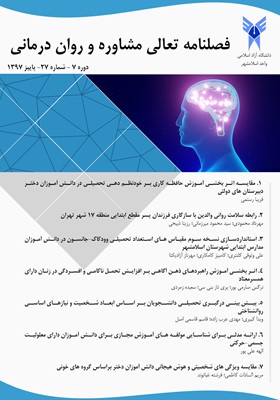اثر بخشی آموزش راهبردهای ذهن آگاهی بر افزایش تحمل ناکامی و افسردگی در زنان دارای همسرمعتاد
محورهای موضوعی : فصلنامه تعالی مشاوره و روان درمانینرگس صارمی پور 1 , پری ناز بنی سی 2 , سعیده زمردی 3
1 - کارشناسی ارشد رشته مشاوره خانواده دانشگاه آزاد اسلامی تهران غرب ،تهران،ایران
2 - استادیار دانشگاه آزاد واحد تهران غرب ، تهران، ایران
3 - استاد یار دانشگاه آزاد اسلامی واحد تهران غرب ،تهران،ایران
کلید واژه: افسردگی, معتادان, آموزش مهارت های ذهن آگاهی, تحمل ناکامی,
چکیده مقاله :
هدف: هدف از انجام این پژوهش، بررسی تاثیر آموزش مهارت های ذهن آگاهی بر افزایش تحمل ناکامی و کاهش افسردگی در زنان دارای همسر معتاد مراجعه کننده به مرکز مشاوره در کرج بود. روش: این مطالعه از نوع نیمه آزمایشی با طرح پیش آزمون- پس آزمون با گروه کنترل بود. جامعه آماری این پژوهش همسران معتادان مراجعه کننده به مرکز مشاوره در کرج بودند که شامل 100 نفر بودند. طبق روال پژوهش های نیمه آزمایشی، تعداد 30 نفر با روش نمونه گیری در دسترس به عنوان نمونه انتخاب شدند و به تصادف در دو گروه آزمایشی (15 نفر) و کنترل (15 نفر) قرار گرفتند. گروه آزمایش در جلسه های آموزش مهارت های ذهن آگاهی شرکت داده شدند و گروه کنترل هیچ مداخله ای دریافت نکردند. برای جمع آوری داده های پژوهش از مقیاس ناکامی هرینگتون (2005) و آزمون افسردگی بک استفاده شد. به منظور تجزیه و تحلیل داده ها از نرم افزار آماری spss استفاده شد. علاوه بر روش های آمار توصیفی، از روش آماری کوواریانس برای تجزیه و تحلیل فرضیه های پژوهش استفاده شد. یافته ها: نتایج نشان داد، آموزش مبتنی بر ذهن آگاهی در تحمل ناکامی و افسردگی همسران معتادان مراجعه کننده اثر بخش است. نیز نتایج نشان داد، آموزش مبتنی بر ذهن آگاهی در تحمل ناکامی و کاهش افسردگی همسران معتادان مراجعه کننده اثر بخش است. همچنین نتایج نشان داد، آموزش مبتنی بر ذهن آگاهی در پیشرفت همسران معتادان اثربخش است. دیگر نتایج نشان داد، آموزش مبتنی بر ذهن آگاهی در شایستگی همسران معتاد اثر بخش است. نتیجه گیری: یافته ها به صورت کلی بیانگر این بودند که آموزش مبتنی بر ذهن آگاهی در تحمل ناکامی و کاهش افسردگی همسران معتادان مراجعه کننده به مرکز مشاوره در کرج اثر بخش است.
Purpose: The purpose of this study was to investigate the effect of teaching mindfulness skills on increasing failure tolerance and reducing depression in women with addicted spouse referred to the counseling center in Karaj. Method: This study was a semi-experimental design with pretest-posttest design with control group. The statistical population of this study was the wives of addicts who referred to the counseling center in Karaj, which included 100 people. According to the semi-experimental research, 30 samples were selected by sampling method and were randomly divided into two experimental (15 subjects) and control (n = 15) groups. The experimental group participated in mindfulness training sessions and the control group did not receive any intervention. To collect the data, the Herington Failure Scale (2005) and the Beck Depression Test were used. SPSS software was used to analyze the data. In addition to descriptive statistics, the covariance statistical method was used to analyze the research hypotheses. Findings: The results indicated that Mindfulness-based education was effective in relieving the failure and depression of the wives of the addicts referred to. Also, the results showed that Mindfulness-based education is effective in relieving failure and reducing the depression of spouses of addicts who are referred. Also, the results showed that Mindfulness Education is effective in the development of addicted spouses. Other results indicated that Mindfulness-based education is effective in the competence of addicted wives. Discussion and Conclusion: The findings generally indicate that Mindfulness-based education is effective in reducing failure and reducing the depression of addicts' wives referring to the counseling center in Karaj.
_||_


